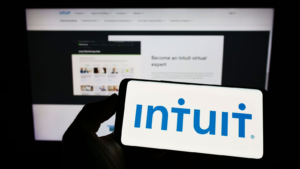
People will always need to borrow money. They will also want to discover opportunities to save money and grow their capital through investments. The financial sector offers these opportunities for consumers.
Some corporations in the fintech industry have become stable cash flow producers. Others are high-growth corporations that have recently become profitable and are rapidly increasing their profit margins. There is a steady demand in the industry, which means investors will find plenty of opportunities.
If you’re looking for some opportunities in the finance sector, these are some of the top fintech stocks to consider.
Intuit (INTU)

Intuit (NASDAQ:INTU) is the corporation behind popular products like Quickbooks, Turbotax and CreditKarma. The company’s software comes in handy when you have to pay taxes and get your finances in order.
The fintech giant has a $177 billion market cap and a 65x P/E ratio. The corporation offers a 0.57% dividend yield which is low, but the dividend growth rate has been captivating. Intuit recently hiked its quarterly dividend from 78 cents to 90 cents. That’s a 15.4% year-over-year increase.
Rising net income will help the company sustain a double-digit dividend growth rate for many years. The company more than doubled its net income in Q2 FY24, while revenue grew by 11% year-over-year.
Moreover, the company’s Small Business and Self-Employed Group revenue increased by 18% year-over-year. That’s a notable development since this segment is Intuit’s largest component. More growth in this area will translate into elevated revenue growth throughout the company.
Intuit is aiming for 11% to 12% year-over-year revenue growth for full fiscal 2024. GAAP diluted earnings per share is expected to reach $9.37 to $9.67 which indicates 11% to 15% year-over-year growth.
Robinhood (HOOD)

Robinhood (NASDAQ:HOOD) didn’t do itself any favors during the GameStop (NYSE:GME) fiasco, but the fintech corporation looks very promising with the bad press far behind it. Robinhood offers a suite of financial products that is hard to beat. The company’s offers are bound to attract new users and keep existing members more active.
Robinhood is offering a credit card with 3% cashback across the board. Most credit card issuers only offer that amount of cash back for a single category. You also have the opportunity to open an IRA with Robinhood and receive a 3% match on your contributions. While you need a Robinhood Gold account to access these features, the cashback and matches easily pay for the membership fee.
The fintech company isn’t just a trading app that relies on investors’ sentiment on cryptocurrencies to perform well anymore. The company is innovating beyond stock investing and might pressure other fintech companies to follow suit with their credit card cash back rewards and IRA matches.
The valuation may not be the best, but long-term investors can wait it out. Q4 2023 revenue increased by 24% year-over-year, while net income became positive to the tune of $30 million. The company is competitive in the financial industry and it wouldn’t be surprising if Robinhood announced another game-changing product by the end of the year.
Mastercard (MA)

Mastercard (NYSE:MA) has generated solid returns for shareholders. The stock is up by 33% over the past year and has gained 104% over the past five years. Shares trade at a 41x P/E ratio and offer a 0.55% dividend yield. Mastercard makes up for the low yield with a high dividend growth rate. This fintech corporation hiked its quarterly dividend from 57 cents per share to 66 cents per share in 2024. That’s a 15.8% year-over-year increase.
The credit and debit card leader reported 13% year-over-year revenue growth and 11% year-over-year net income growth in the fourth quarter of 2023. Profit margins came to 42.6% for the quarter.
People will continue to use their credit cards to buy products and services. Even when people scale back on purchases or one fad replaces another, consumers will continue to use their Mastercard credit and debit cards. The fintech giant makes a small percentage of every transaction and those purchases add up. Shareholders have been rewarded nicely over the long run, which means Mastercard seems poised to deliver more gains for its investors.
On the date of publication, Marc Guberti did not have (either directly or indirectly) any positions in the securities mentioned in this article. The opinions expressed in this article are those of the writer, subject to the InvestorPlace.com Publishing Guidelines.




